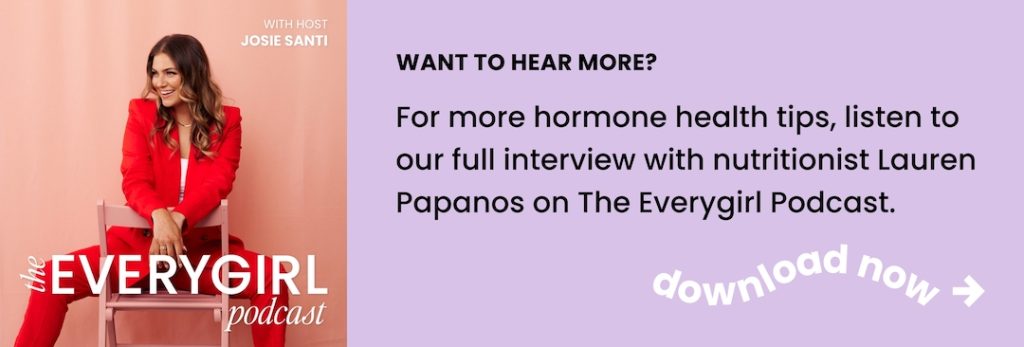Hormone health has exploded across social media as more and more women realize their bodies require personalized attention. Between conversations about cycle syncing and metabolism, it’s become increasingly clear that hormones are a crucial part of our overall health and well-being that has long been overlooked. On this week’s episode of The Everygirl Podcast, we spoke with registered dietician nutritionist and hormone specialist Lauren Papanos about how to identify hormone imbalances, how the metabolism and thyroid are connected to hormonal health, and tips to address hormone problems—from PCOS to period cramps to thyroid imbalances.
It seems like every person with a reproductive cycle is experiencing some type of symptom or diagnosis, whether it’s PCOS, infertility, endometriosis, PMS, period headaches, or acne. The truth is no, you’re not meant to suffer from these symptoms—these are all signs that something is off in the body, which means you actually can heal. We all deserve to have (and can have) healthy, regular, pain-free periods. We asked Papanos why so many people deal with reproductive issues and she confirmed it is no coincidence—we’re a generation of women dealing with unaddressed underlying issues. Read on for the three main reasons Papanos says people are dealing with hormonal symptoms and imbalances today, and listen to her episode on The Everygirl Podcast for more tips to optimally heal.
1. Malnourishment
According to Papanos, today’s soil contains 10 percent of the vitamin content that it did 50 years ago, meaning the vast majority of us are not receiving the nutrients that we need in order to sustain healthy hormone levels. On top of the agricultural changes, people are eating more packaged food and less food from the earth. “Packaged foods, even if they’re ‘healthy’ packaged foods, still don’t have all of the phytonutrients and vitamins that are alive and active for our body to be able to utilize,” Papanos said. “Our society is really undernourished and these nutrients are the building blocks for us to be able to make hormones.”
If you’re experiencing a hormonal imbalance, ensure that you are eating foods that provide your body with sufficient vitamins and minerals. Specifically for hormones, Papanos recommends prioritizing daily intake of vitamin B, zinc, iron, and selenium, whether through your diet or supplementation.
2. Endocrine disruptors
In addition to the decrease in nutrient availability, Papanos highlights the presence of artificial chemicals and toxins in our food, environment, and products as a key reason why many women are experiencing hormone imbalances today. “There’s been such an increase in endocrine-disrupting chemicals in the last 10-20 years that continues to increase,” She explained. “These chemicals can impact the body’s ability to use the hormones that it’s making.” According to Papanos, fragrances, pesticides, and herbicides can all impact the body’s ability to activate the hormones it’s making. Examining the potential man-made toxins that you consume on a daily basis might lend some answers as to why you’re experiencing a hormonal imbalance—start with eating as organic as possible and replace beauty products, cleaning supplies, etc. with non-toxic alternatives.
3. Hustle culture
An increase in workaholism and hustle culture just might be the reason why your hormones are out of whack. The pressure of hustle culture and an increase in stress levels can negatively impact our nervous system regulation, which in turn has an impact on our hormone health. “If the nervous system is constantly in an anxious and dysregulated state, that’s going to impact the brain’s signals to be able to make the right amount of hormones that it should,” Papanos explained. It’s crucial to manage stress and have moments of relaxation in order to properly regulate the nervous system. Taking stock of our participation in hustle culture and the pressure we put on ourselves can be a key step toward solving our hormonal imbalances.



 "
"
